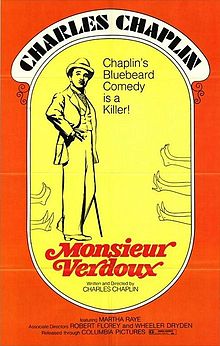- Monsieur Verdoux
-
Monsieur Verdoux 
poster for 1972 re-releaseDirected by Charles Chaplin Produced by Charles Chaplin Written by Orson Welles (idea)
Charles ChaplinStarring Charles Chaplin
Martha Raye
William Frawley
Marilyn Nash[1]Music by Charles Chaplin Cinematography Roland Totheroh
Curt Courant (uncredited)Editing by Willard Nico Distributed by United Artists (1947 release)
Columbia Pictures (1972 re-release)
Janus FilmsRelease date(s) April 11, 1947 Running time 124 minutes Country United States Language English Monsieur Verdoux is a 1947 black comedy film directed by and starring Charles Chaplin. The supporting cast includes Martha Raye, William Frawley, and Marilyn Nash.
Contents
Plot
The film is about an unemployed banker, Henri Verdoux, and his sociopathic methods of attaining income. While being both loyal and competent in his work, Verdoux has been laid-off. To make money for his wife and child, he marries wealthy widows and then murders them. His crime spree eventually works against him when two particular widows break his normal routine. The film ends as Verdoux is being led to the guillotine in the prison courtyard after dismissing his killing of a few as no worse than the highly-praised killing of large numbers in war.
Production
The script for this film, the idea for it given by Orson Welles, was inspired by the case of serial killer Henri Désiré Landru. Welles sought to direct the film with Chaplin as star, but Chaplin backed out at the last minute, on the grounds that he'd never been directed by somebody else in a full length film before and wasn't willing to start, which was not tecnically correct since he was directed in one feature film during his Keystone days. Instead, Chaplin bought the script from Welles and rewrote parts of it, crediting Welles only with the idea. The lead character kills to make money, hence he is not (in his eyes) a murderer.
Another story suggests that although the script had yet to be written, Welles wanted Chaplin to play the lead role. Chaplin, deciding that he didn't want to have to write the script with Welles, opted out, saying in effect "If it isn't written yet, I'm not interested." After seeing the film, Welles insisted on receiving a screen credit for the story idea.
Since the film is a talking picture, there is some comedy in the dialogue as well as some physical comedy. Chaplin tended to work with a repertory company of actors who performed exclusively in Chaplin's films. Monsieur Verdoux, atypically for a Chaplin film, features some familiar Hollywood actors, including Martha Raye, William Frawley and Fritz Leiber, Sr.. Rumors have persisted that Chaplin's 1915-1923 leading lady Edna Purviance made an appearance in the film. Chaplin biographer David Robinson wrote that Purviance did return briefly to the Chaplin Studios and prepared for a small role in the film, but that she did not go before the cameras.
Reception
This was the first feature film in which Chaplin's character bore no resemblance to his famous "Tramp" character (The Great Dictator did not feature the Tramp, but his "Jewish barber" bore sufficient similarity), and consequently was poorly received in America when it first premiered. It was, however, more successful in Europe. The film and its dark themes were ill-suited to the American political and cultural climate of the time (less than two years after World War II ended), and Chaplin's popularity and public image had been irrevocably damaged by multiple scandals and political controversies prior to its release.[2]
Chaplin was subjected to unusually hostile treatment by the press while promoting the opening of the film, and some boycotts took place during its short run. At one press conference to promote the film, Chaplin made his speech, then invited questions from the press with the words "Proceed with the butchering".[citation needed] Since then, it has gained enough of a following to be considered a cult film.
Despite its poor critical and commercial performance, the film was nominated for the 1947 Academy Award for Best Writing (Original Screenplay).
In 1964, Chaplin allowed Verdoux to be re-released along with several Chaplin films to play at the New York Plaza as part of a Chaplin film festival. The film was not only the biggest hit of the entire festival, but it broke box-office records for the Plaza.
References
- ^ "Actress Marilyn Nash dies, Starred with Chaplin in 'Monsieur Verdoux'". Variety Magazine. 2011-10-14. http://www.variety.com/article/VR1118044450?categoryid=13&cs=1&cmpid=RSS%7CNews%7CLatestNews. Retrieved 2011-10-16.
- ^ Peary, Danny (1988). Cult Movies 3. New York: Simon & Schuster Inc.. pp. 136–140. ISBN 0-671-64810-1.
External links
- Monsieur Verdoux at the Internet Movie Database
- Monsieur Verdoux at AllRovi
- DVD Journal article by Mark Bourne
Categories:- 1947 films
- English-language films
- American films
- 1940s comedy films
- American black comedy films
- American comedy-drama films
- American criminal comedy films
- American satirical films
- Black-and-white films
- Films directed by Charlie Chaplin
- Films with a capital punishment theme
- Serial killer films
- United Artists films
Wikimedia Foundation. 2010.
